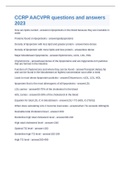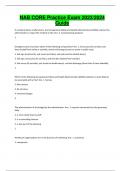CCRP AACVPR questions and answers 2023
How are lipids carried - answeron lipoproteins in the blood because they are insoluble in
water
Proteins found on lipoproteins - answerapolipoproteins
Density of lipoprotein with less lipid and greater protein - answermore dense
Density of lipoprotein with more lipids and less protein - answerless dense
Major bloodstream lipoproteins - answerchylomicrons, vLDL, LDL, HDL
Chylomicrons - answerleast dense of the lipoproteins and are triglyceride-rich particles that are formed in the intestine
Function of Chylomicrons and where they can be found - answerTransport dietary fat and can be found in the bloodstream at highest concentration soon after a meal
Least to most dense lipoprotein particles - answerChlyomicron, vLDL, LDL, HDL
lipoprotein that is the most atherogenic of all lipoproteins - answerLDL
LDL carries - answer60-70% of the cholesterol in the blood
HDL carries - answer20-30% of the cholesterol in the blood
Equation for total LDL-C in bloodstream - answerLDL= TC-(HDL-C-(TG/5))
When does calculating LDL-C become inaccurate - answerwhen TG exceeds 400mg/dL
Desirable total cholesterol level - answer<200
Borderline high total cholesterol level - answer200-240
High total cholesterol level - answer>240
Optimal TG level - answer<150
Borderline high TG level - answer150-199
High TG level - answer200-499 Very high TG levels - answer>500
Optimal in men HDL levels - answer>40
Optimal in women HDL levels - answer>50
Optimal LDL-C levels - answer<100
Near optimal LDL-C levels - answer100-129
Borderline high LDL-C levels - answer130-159
High LDL-C levels - answer160-189
Very high LDL-C levels - answer>190
Hypertriglycerdemia is associated with high levels of - answerVLDL-C
Non-HDL-Cholesterol calculation - answerHDL-C - Total cholesterol
Atherogenic dyslipidemia - answerElevated levels of TG, low HDL-C and only modest elevations of LDL-C
Metabolic syndrome - answerrequires the presence of any 3 of the following conditions: abdominal obesity, elevated TG, low HDL, elevated BP and hyperglycemia
Criteria for metabolic syndrome: Abdominal obesity - answerWC >102 cm (40 in) for men WC >88cm (35 in) for women
Criteria for metabolic syndrome: Hypertriglyceremia - answer≥150 or drug treatment
Criteria for metabolic syndrome: Low HDL - answer<40 for men <50 for women
Criteria for metabolic syndrome: Elevated BP - answerSBP ≥130 DBP ≥85
or drug treatment
Criteria for metabolic syndrome: Hyperglycemia - answerFasting glucose ≥100 or drug treatment
AACVPR understanding of atherosclerosis - answerTraditional risk factors are a source of inflammatory changes in the blood vessel wall --> which attract lipid laden macrophages and other inflammatory cells to enter the blood vessel wall --> where they proliferate and develop atherosclerotic plaques --> which are the source of the clinical manifestations of CHD
Fatty streaks - answerlipid deposition (daily lipid laden macrophages) in the arterial wall
Lumen - answeropening inside of the blood vessel
fibrous plaque - answerLarger and more obstructive lesoions consisting of an outer fibrous
Why do plaque ruptures occurs prior to the development of cardiovascular symptoms in many cases - answerAtherosclerotic plaques that are prone to rupture tend to be younger, more immature plaques that usually do not produce the degree of luminal narrowing required to develop exertion symptoms
What occurs after a plaque rupture - answerClot formation within the lumen of the coronary artery, potential resulting in an acute coronary syndrome from the sudden development of severe obstruction to coronary blood flow
Examples of foods high in dietary cholesterol - answerAnimal products ( meat, poultry, fish, eggs, butter, cheese, whole and 2% milk)
Examples of foods high in saturated fatty acids - answerhigh fat meats (beef, lamb, pork, poultry with skin, beef fat, lard), dairy products, tropical oils ( palm oil, palm kernel oil, coconut oil)
Examples of foods high in trans fatty acids - answerfried foods, baked goods, stick margarines, shortenings
Examples of foods high in monounsaturated fatty acids - answervegetable oils (olive oil,
canola oil, peanut oil, sunflower oil, sesame oil) , avocados, peanutbutter, nuts and seeds
Examples of foods high in polyunsaturated fatty acids - answervegetable oils (soybean oil, safflower oil), fatty fish ( salmon, mackerel, herring, trout) nuts (walnuts), seeds (sunflower seeds)
ACC/AHA Lifestyle Management Guidelines Dietary recommendations for lowering LDL-C - answer1) consume a dietary pattern that emphasizes; vegetables, whole grains
and fruits; low fat dairy products, fish, legumes, non-tropical oils and nuts; limit sweets, sugared beverages and red meats 2) Aim for a diet of 5-6% of calories from saturated fats 3) Reduce percent calories from saturated fats 4) Reduce percent of calories from trans fats
What are unrefined carbohydrates referred as - answerwhole grains Strongest evidence for dietary patterns - answerDASH diet (dietary approach to stop hypertension)
Function of statins - answerreduce cholesterol production in the liver by inhibiting the enzyme HMG CoA reductase
When to investigate into possible secondary causes of hyperlipidemia - answerLDL-C >190 mg/dL and triglycerides >600mg/dL
LDL-C reduction on low intensity statin - answer<30%
LDL-C reduction on moderate intensity statin - answer30-<50%
LDL-C reduction on high intensity statin - answer>50%
Secondary causes of elevated LDL - answerdiets high in saturated fat/trans fat, weight gain, anorexia, diuretics, cyclosporine, glucocorticoids, amiodarone, binary obstruction, nephrotic syndrome, hypothyroidism, obesity, pregnancy
Secondary causes of elevated triglycerides - answerDiets high in refined carbs, weight gain, very low fat diets, excessive alcohol intake, estrogens, glucocorticoids, bile acid sequestrates, protease inhibitors, retinoid acid, anabolic steroids, sirolimus, ralozifene, tamoxifen, beta blockers, thiazide diuretics, chronic renal failure, nephrotic syndrome, lipodystrophies, diabetes, hypothyroidism, obesity, pregnancy
Rosuvastatin 5, 10mg intensity - answermoderate
Rosuvastatin 20, 40 mg intensity - answerhigh
Atorvastatin 10, 20 mg intensity - answermoderate
Atorvastatin 40, 80mg intensity - answerhigh
Simvastatin 10mg intensity - answerlow
Simvastatin 20, 40 mg intensity - answermoderate
Pravastatin 10, 20 mg intensity - answerlow
Pravastatin 40, 80mg intensity - answermoderate
Lovastatin 20mg intensity - answerlow
Lovastatin 40mg intensity - answermoderate





